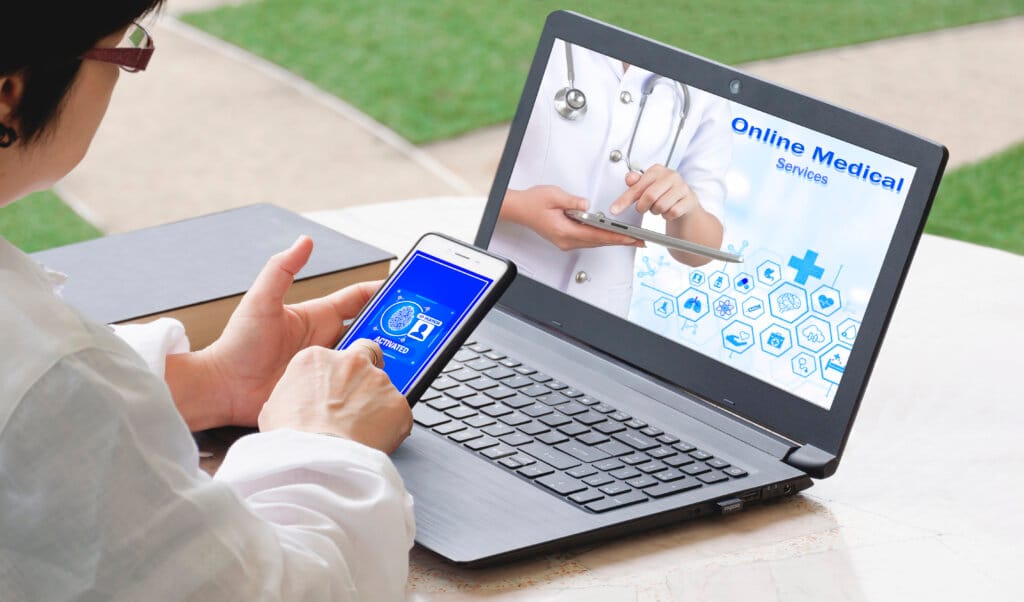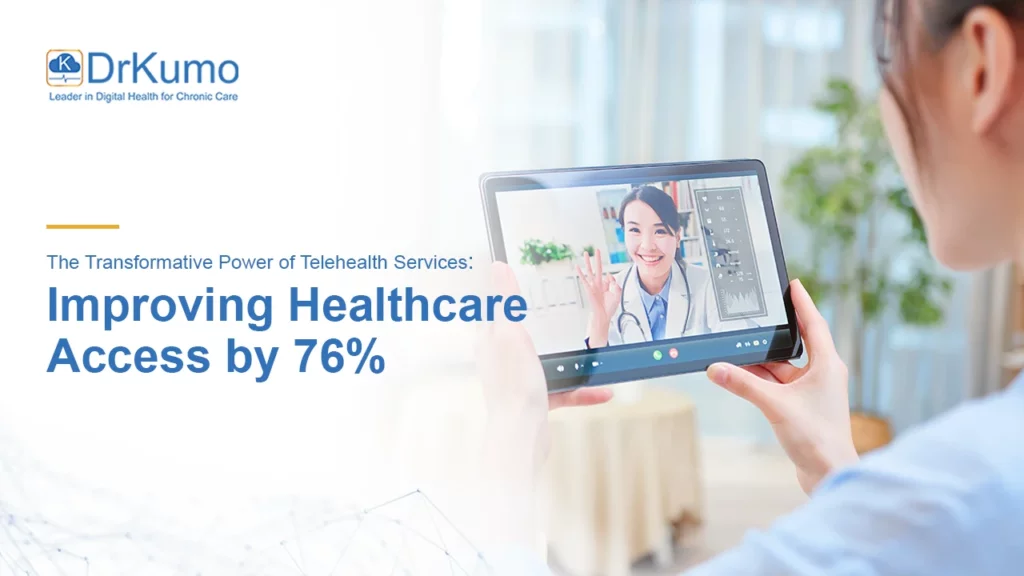In recent years, telehealth has rapidly reshaped healthcare with the ease of a simple click, where patients no longer face long waits or travel miles to see a doctor. Telehealth services have emerged as a revolutionary solution reshaping the healthcare landscape by transforming how we access medical care. According to the AHA, telehealth has significantly increased access to healthcare services, with reports indicating that 76% of U.S. hospitals now utilize telehealth technologies.
This significant shift not only enhances convenience but also empowers patients to take charge of their health. By breaking down geographical barriers and providing continuous support for chronic disease management.
In this article, we will explore the profound impact of telehealth on healthcare delivery and patient outcomes, highlighting the key factors that contribute to this remarkable transformation. Join us as we delve into how telehealth is revolutionizing access to care and improving lives across the nation.
What is Telehealth?
Telehealth is revolutionizing the way we experience healthcare by bringing medical services right to our fingertips. Patients can now consult their physicians from the comfort of their home, all thanks to digital technology. Telehealth encompasses an exciting array of services, from virtual consultations and remote patient monitoring to engaging digital health education.
With the power of video calls, secure messaging, and innovative monitoring tools, patients can now receive high-quality care without ever stepping foot in a clinic. This incredible flexibility makes telehealth an essential lifeline for those who face barriers to traditional healthcare access, ensuring that everyone can prioritize their health and well-being—no matter where they are!
The Rise of Telehealth Services
Until recently, telehealth was a niche service, primarily used for remote consultations in specific cases. The pandemic necessitated a rapid shift towards virtual healthcare. According to JMIR publications, many providers transitioning over 70% of their outpatient visits to telehealth formats. This dramatic change was driven by the need to minimize the risk of viral transmission while ensuring that patients continued to receive necessary medical care.
Health systems across the United States quickly adapted by implementing telehealth services, which allowed them to maintain continuity of care during a time when in-person visits were severely restricted.

Breaking Down Barriers to Access
As telehealth continues to evolve, there are so many potential barriers that need to be considered in breaking down, as it holds the potential to revolutionize healthcare access. Because of these barriers, telehealth solution companies offer an innovative solution to our healthcare’s persistent challenges.
Geographic limitations
For many individuals living in rural or underserved areas, geographic isolation poses a significant barrier to healthcare access. Telehealth bridges this gap by enabling patients to consult with healthcare providers without the need for lengthy travel. This is particularly beneficial for those with mobility issues or chronic conditions that make travel challenging.
Convenience and flexibility
Beyond eliminating travel, telehealth offers unparalleled convenience for patients with busy schedules or those juggling multiple responsibilities. Virtual visits eliminate commute times and allow patients to schedule appointments at their convenience. This ease of access encourages individuals to seek care proactively, leading to better management of chronic conditions such as diabetes and hypertension.
Enhanced engagement with healthcare providers
Telehealth facilitates continuous communication between patients and healthcare providers. Frequent virtual check-ins help maintain patient engagement and adherence to treatment plans. For example, remote patient monitoring allows healthcare professionals to track vital signs and symptoms in real-time, ensuring timely interventions when necessary.
Improved access for vulnerable populations
Telehealth has proven particularly beneficial for vulnerable populations, including low-income families and the elderly. Research indicates that these groups often face significant barriers to accessing traditional healthcare services. By utilizing telehealth, patients can connect with specialists without the need for lengthy travel or long wait times, ultimately reducing health disparities.
Impact on Chronic Disease Management
Telehealth has been instrumental in managing chronic diseases effectively, revolutionizing the way patients interact with their healthcare providers. Frequent interactions through virtual visits enable better monitoring of conditions such as heart failure and diabetes, leading to improved health outcomes. Here are some key points highlighting the impact of telehealth on chronic disease management:
- Enhanced Monitoring: Telehealth allows for continuous monitoring of vital signs and health metrics, enabling healthcare providers to track patients’ conditions in real-time. This proactive approach helps in identifying potential issues before they escalate.
- Remote Patient Monitoring (RPM): RPM technologies facilitate the collection of patient-generated health data (PGHD) using mobile devices. Commonly monitored data includes blood pressure, glucose levels, and weight, which can be sent directly to healthcare professionals for evaluation.
- Reduced Hospital Admissions: Studies show that patients enrolled in remote monitoring programs experience significantly fewer hospital admissions. For instance, one program reported a 23% reduction in hospital admissions and a 44% decrease in 30-day readmissions compared to those relying solely on in-person visits.
- Improved Patient Engagement: Telehealth encourages patients to take an active role in managing their health. With regular virtual check-ins and access to educational resources, patients are more informed about their conditions and treatment plans, leading to better adherence.
- Accessibility for Vulnerable Populations: Telehealth services have expanded access for individuals who may face barriers to traditional healthcare, such as those living in rural areas or those with mobility challenges. This inclusivity is crucial for managing chronic diseases effectively.
- Cost-Effectiveness: By reducing the need for in-person visits and hospitalizations, telehealth can lower overall healthcare costs for both patients and providers. This financial benefit makes it easier for patients to receive consistent care without incurring high expenses.
- Examples of Telehealth Technologies: Various tools are utilized in chronic disease management, including:
- Glucose meters for diabetes management.
- Heart rate and blood pressure monitors.
- Continuous surveillance monitors for conditions like dementia.
- At-home tests that help substance abuse patients stay accountable
Medication Adherence and Management
One of the persistent challenges in chronic disease management is medication adherence. Telehealth addresses this issue by facilitating medication reconciliation during virtual visits. Patients can discuss their medications with providers while having their prescriptions on hand, reducing confusion and promoting adherence.
Telehealth’s Role in Preventive Care
Telehealth services are not only beneficial for managing existing conditions but also play a crucial role in preventive care. Virtual consultations enable healthcare providers to conduct screenings and assessments that can identify potential health issues before they become severe. For example, routine check-ups via telehealth can help monitor risk factors such as obesity or high blood pressure, allowing for early interventions that promote healthier lifestyles.
The Future of Telehealth Services
Looking ahead, the integration of telehealth into mainstream healthcare appears promising, with numerous advancements on the horizon. As technology continues to evolve, new tools will emerge to enhance patient engagement and care delivery further. Policymakers must also continue supporting telehealth through favorable regulations and reimbursement models to ensure its sustainability post-pandemic. Here are some key developments expected in the future of telehealth services:
- Advanced technologies: The incorporation of artificial intelligence (AI) and machine learning will revolutionize telehealth by improving diagnostics, risk prediction, and personalized treatment plans. AI can analyze vast datasets to identify patterns that enhance clinical decision-making, particularly in fields like radiology and pathology.
- Expansion of remote monitoring: Remote patient monitoring (RPM) technologies will become increasingly sophisticated, allowing for continuous tracking of vital signs and chronic conditions. This capability enables healthcare providers to intervene proactively, reducing hospital admissions and improving patient outcomes.
- Integration with wearable devices: The use of wearable technology, such as smartwatches and fitness trackers, will facilitate real-time health monitoring. These devices can collect valuable data on patients’ health metrics, providing healthcare providers with insights that inform treatment decisions.
- Specialized telehealth services: The future will see an expansion of telehealth services into specialized fields such as telesurgery, telepsychiatry, and teledermatology. This shift will allow patients to access specialized care without geographical constraints, enhancing the overall quality of care.
- Globalization of telehealth: Telehealth will continue to break down international barriers, enabling cross-border consultations. Patients will be able to seek expert opinions from specialists around the world, increasing access to high-quality healthcare services.
- Policy evolution: Governments and regulatory bodies are actively adapting policies to support the growth of telehealth. This includes establishing sustainable reimbursement models that recognize the value of virtual care, and ensuring that healthcare providers are incentivized to offer telehealth services.
- Enhanced patient experience: As telehealth platforms evolve, they will offer more comprehensive services that integrate seamlessly with electronic health records (EHRs). This integration will streamline workflows for healthcare providers and improve the overall patient experience by providing easy access to medical history and treatment plans.
- Focus on mental health: The demand for mental health services has surged, and telehealth provides a crucial avenue for delivering these services. Virtual therapy sessions can reduce stigma and increase accessibility for individuals seeking mental health support.
- Continuous improvement in quality of care: Ongoing research and advancements in telehealth technology will ensure that quality of care remains a priority. Regular assessments and updates to telehealth practices will help maintain high standards in patient care delivery.
Integrating DrKumo RPM Solutions: A Game Changer for Telehealth Services
As telehealth continues to reshape the healthcare landscape, DrKumo’s Remote Patient Monitoring (RPM) solutions stand out as a pivotal component in enhancing healthcare access and quality. By leveraging advanced technology, DrKumo RPM enables real-time tracking of vital signs, allowing healthcare providers to continuously monitor patients’ health conditions. This proactive approach facilitates early detection of potential health issues, reducing the risk of complications.
Additionally, the system empowers patients by providing access to their health data, medication reminders, and personalized care plans, fostering a sense of ownership over their health and encouraging adherence to treatment protocols. Importantly, DrKumo RPM is designed to reach patients in remote or underserved areas, breaking down geographical barriers that often limit access to healthcare services.
Moreover, DrKumo RPM solutions offer significant cost-effectiveness by reducing unnecessary hospitalizations and emergency room visits through effective remote monitoring, ultimately lowering healthcare costs for both patients and providers. The seamless integration of DrKumo’s RPM into existing healthcare infrastructures enhances clinical workflows and improves the overall patient experience.
With a strong emphasis on data privacy, DrKumo adheres to HIPAA regulations and employs advanced encryption methods to protect patient information, fostering trust among patients and providers alike. By integrating DrKumo RPM solutions into telehealth services, healthcare providers can significantly enhance patient outcomes while improving access to care, making it a critical player in the future of patient-centered healthcare.
Takeaways
Telehealth services have significantly improved healthcare access transforming how patients interact with their healthcare providers. By breaking down barriers to access, enhancing patient engagement, and improving chronic disease management, telehealth has established itself as a vital component of modern healthcare delivery.
Healthcare providers are witnessing firsthand the remarkable benefits of telehealth, which not only helps streamline care, but also fosters a more inclusive and equitable healthcare system. Imagine the impact on your practice when you can provide timely, personalized care to patients regardless of their location—it’s a game-changer that no provider will soon forget.
As we move forward into this exciting new era of healthcare, embracing innovative solutions like DrKumo’s Remote Patient Monitoring (RPM) will be crucial. DrKumo RPM empowers healthcare providers to monitor patients continuously, ensuring proactive interventions and better health outcomes.
Don’t miss out on the opportunity to elevate your practice and enhance patient care. Contact us today to learn more about how DrKumo RPM can transform your telehealth services and keep you at the forefront of modern healthcare!
Disclaimer: Results may vary based on individual circumstances. Telehealth services are not a substitute for emergency care. Consult your provider for medical advice.









